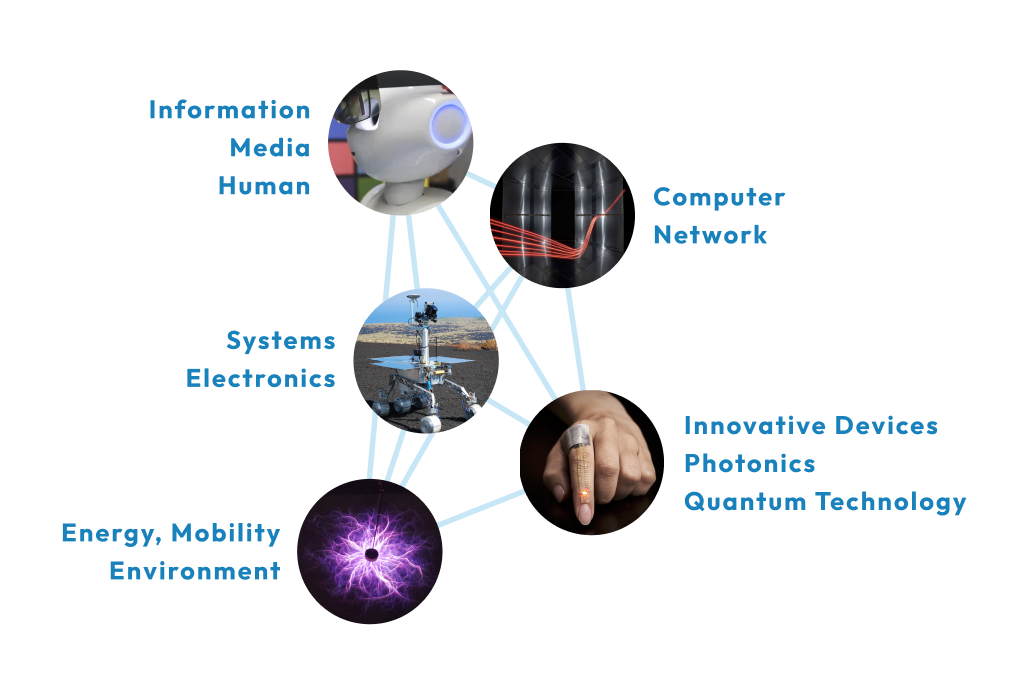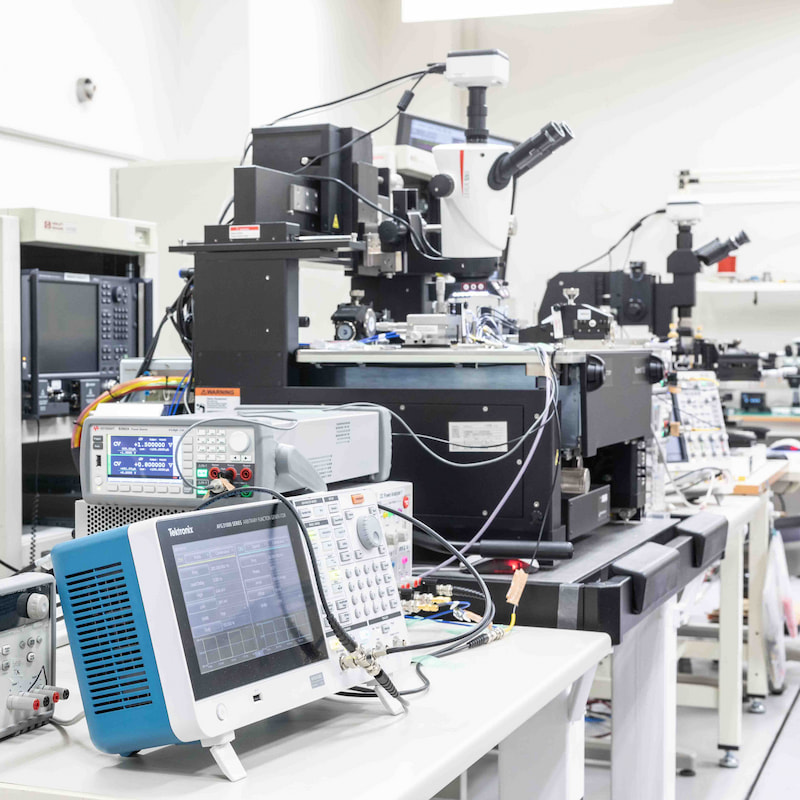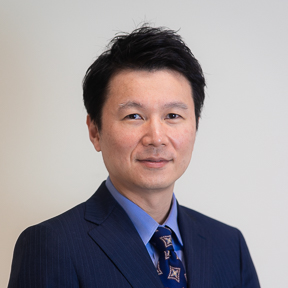What to learn at EEIC
EEIC classesCurriculum/lecture system chartAnnual ScheduleTimetablesFacilities and EquipmentGoing on to EEIC
About guidanceQ&A about going on to EEICInformation about EEIC Course Selection GuidanceLearn more about EEIC
Lecture at KomabaReunionDocument archiveLinks to related organizationsPage for internal studentsElectrical Engineering OfficeDepartment of Electrical Engineering and Information SystemsGraduate School of Information Science and Technology
Department of Information and Communication EngineeringGraduate School of Frontier Sciences
Department of Advanced EnergyThe Interfaculty Initiative in Information Studies/Graduate School of Interdisciplinary Information Studies
Innovate the Information Society through Physics.
Renovate the Physical World through Information.
Humanity has continued to prosper by skillfully manipulating the real world of physics and the abstract world of information while going back and forth between these two worlds.
From the invention of language to the present day, manipulating physics through the abstraction of information has changed our society with tremendous power.
Physics is necessary to manipulate information, and if you face physics, you will see new ways to use information. Physics and information. Hardware and software. Principles and applications. Real space and cyber space. Learning one or the other is not enough, and what is needed now is the ability to take a bird's-eye view of both and go back and forth between them.
In the Department of Information and Communication Engineering and the Department of Electrical and Electronic Engineering, we are cultivating such human resources.
Department of Information and Communication Engineering and Department of Electrical and Electronic Engineering (EEIC)
Department of Electrical and Electronic Engineering, Department of Information and Communication Engineering
EEIC consists of EE, which stands for the Department of Electrical and Electronic Engineering, and IC, which stands for the Department of Information and Communication Engineering.
They do not offer studies in completely different fields, and you can choose either department depending on which of the following areas of study you wish to focus on.
Both departments have curriculum designed to nurture human resources with a bird's-eye view of physics and information, hardware and software, and principles and applications.
The Department of Information and Communication Engineering is recommended mainly for those who are interested in the information field, and the Department of Electrical and Electronic Engineering is mainly for those who are interested in physics-related science and technology. Whichever you choose, you will be able to study both in depth, or you can concentrate on only one of them. In either case, please forget about any previous difficulties you may have had with the subject. You will be able to master the studies directly related to the goal of what is needed in society from the fundamentals all over again.
If you are interested in media information, contents, and people, or computers and networks, the Department of Information and Communication Engineering is recommended, and if you are interested in nano physics, light quantum, and biotechnology, or energy, environment, and space, the Department of Electrical and Electronic Engineering is recommended. In addition, the field of systems and electronics can be approached from either of these departments.
What you can study at EEIC
Information and Communication Engineering and Electrical and Electronic Engineering are disciplines that are seamlessly connected from the nanoscale to the cosmic scale.
At EEIC, we aim to systematically study these technologies which play a central role in modern technology, and cultivate the ability to develop cutting-edge applications. You will be learning about a wide variety of fields with a broad perspective, while digging deeper into specific fields.

How to study at EEIC

In the Information and Communication Engineering and Electrical and Electronic Engineering departments, we aim to systematically learn the information, electrical, and electronic technologies that play a central role in modern technology and cultivate the academic ability and knowledge to develop cutting-edge applications. EEIC has a curriculum ranging from the basics of information and physics to specialized fields, and students select the theme that suits them best.
In addition, EEIC has a wealth of facilities and a wealth of faculty members and fellow students for your research in electrical engineering.
Career/place of employment

EEIC's undergraduate and master's students find employment in a wide variety of companies and institutions.

Message from the Chair
“Master physics, and transform the information society. Master information, and transform the physical world.”
Our Departments of Information and Communication Engineering and Electrical and Electronic Engineering, collectively forming the Department of Electrical Engineering and Information Systems, trace their origins back to 1873, with the establishment of the Telegraphy Division of the Imperial College of Engineering—the world’s first dedicated department of electrical engineering. This predates even the founding of the University of Tokyo by four years. Over the past 150 years, we have continually honored our rich history and tradition while dynamically evolving, pioneering groundbreaking technologies and contributing significantly to society through cutting-edge research and education in electrical, electronic, and information technologies.
Today’s transformative innovations emerge at the intersection of physical sciences and information technology. Recognizing this, we operate two closely integrated undergraduate departments: the Department of Information and Communication Engineering, which focuses on mastering information science, data science, AI, algorithm design, and communication networks; and the Department of Electrical and Electronic Engineering, which emphasizes a deep understanding of physical sciences such as electromagnetics, quantum mechanics, energy engineering, and semiconductor devices. By combining the strengths of these two interconnected departments, we cultivate students with a broad vision, profound expertise, and the practical skills necessary to excel in our rapidly changing technological landscape.
For students aspiring to engage more deeply with specialized research and advanced innovation, we offer graduate-level education through our Electrical Engineering and Information Systems graduate program. At the graduate level, students expand upon the foundational knowledge acquired at the undergraduate level and engage in advanced, multidisciplinary research projects aimed at transformative technological breakthroughs. Notably, our graduate program places a strong emphasis on global engagement, welcoming talented international students and researchers from around the world, and actively encouraging our own students to participate in collaborative research with top universities and research institutions abroad. Through these efforts, we aim to foster researchers and engineers equipped to thrive on the global stage.
Today’s rapid technological advancements—especially those centered around AI—cannot be achieved solely through innovations in software or algorithms alone. Handling massive datasets and complex computations requires cutting-edge semiconductor devices, ultra-high-speed communication infrastructure, and highly efficient computing technologies. At the same time, new algorithms and energy-efficient hardware solutions, coupled with sustainable energy management technologies, are critical for managing the enormous energy consumption involved. Addressing these complex challenges demands a deeply integrated approach—uniting physics-based technological innovations with advancements in information science and computational techniques.
To support such comprehensive education and research, our department provides world-class facilities, including advanced cleanrooms, state-of-the-art AI data centers, and sophisticated prototyping laboratories. Additionally, we leverage our extensive partnerships with leading industries and research institutions, both domestically and internationally, providing our students with an environment conducive to innovation, experimentation, and practical implementation of their ideas.
Electrical, electronic, and information technologies underpin our modern world, forming the core of all industries and playing an essential role in shaping sustainable societies. The demand for electrical and information engineers and researchers continues to grow globally, reflecting the increasing reliance of modern society on these foundational technologies.
We seek individuals who share our sense of pride and responsibility in this crucial societal mission—those who are driven by passion, curiosity, and determination to actively shape the future. Join us in our proud tradition of excellence and innovation as we build the future together.
Chair
Department of Electrical Engineering and Information Systems